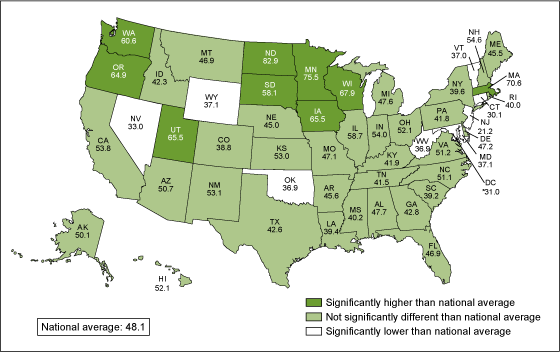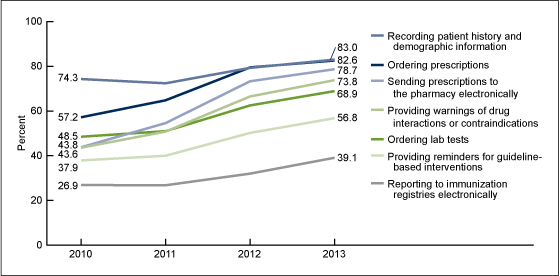15 statistics on EHR adoption use and characteristics among office-based physician practices in the US, 2001–2013.
In January of this year, the CDC released the 2013 findings from their National Ambulatory Medical Care Survey (NAMCS), a nationally representative survey of office-based physicians that collects information on physician and practice characteristics, including the adoption and use of EHR systems.
The NAMCS physicians surveyed were classified as providing direct patient care in office-based practices, as well as clinicians in community health centers. Radiologists, anesthesiologists, and pathologists are excluded.
The 2013 estimates are from the NAMCS EHR survey with a sample of 10,302 physicians. Nonrespondents to the mail survey received follow-up telephone calls. The 2013 NAMCS EHR survey was conducted from February through June 2013.
Here are 15 valuable key findings from the survey:
1. In 2013, 78% of office-based physicians used any type of electronic health record (EHR) system, up from 18% in 2001.
2. In 2013, 48% of office-based physicians reported having a system that met the criteria for a basic system, up from 11% in 2006. The percentage of physicians with basic systems by state ranged from 21% in New Jersey to 83% in North Dakota.
3. In 2013, 69% of office-based physicians reported that they intended to participate (i.e., they planned to apply or already had applied) in “meaningful use” incentives.
4. About 13% of all office-based physicians reported that they both intended to participate in meaningful use incentives and had EHR systems with the capabilities to support 14 of the Stage 2 Core Set objectives for meaningful use.
5. From 2010 (the earliest year that trend data are available) to 2013, physician adoption of EHRs able to support various Stage 2 meaningful use objectives increased significantly.
6. In 2013, 48% of office-based physicians reported having a system that met the criteria for a basic system, up from 11% in 2006—the first year that information on basic systems is available.
State EHR Adoption

7. States with the highest percentage of office-based physicians with a basic EHR system in 2013 were:
a. North Dakota – 83%
b. Minnesota – 76%
c. Wisconsin – 68%
d. Iowa- 66%
e. Utah -66%
f. Oregon – 65%
g. Washington – 61%
h. South Dakota – 56%
i. Rhode Island – 40%
8. The percentage of physicians who had a system meeting the criteria for a basic system was lower than the national average (48%) in eight states (Connecticut, Maryland, Nevada, New Jersey, Oklahoma, Vermont, West Virginia, and Wyoming)
Meaningful Use Adoption
9. 69% of physicians intended to participate in the Medicare or Medicaid EHR Incentive Programs as of 2013.
10. The percentage of physicians participating in either the Medicare or Medicaid Incentive Program increased 5% from 2012 (66%) to 2013 (69%) (5).
11. About 13% of all office-based physicians reported that they both intended to participate in meaningful use incentives and had EHR systems with the capabilities to support 14 of the 17 Stage 2 Core Set objectives for meaningful use (see the Table for the 17 Stage 2 Core Set objectives).
12. Of physicians intending to participate in the EHR Incentives Programs, 19% had EHR systems with the capabilities to support 14 of the 17 Stage 2 Core Set objectives for meaningful use.
13. About 56% of all physicians intended to participate in the EHR Incentive Programs but did not have EHR systems with the capabilities to support 14 of the Stage 2 Core Set objectives for meaningful use. This percentage accounts for about four-fifths of physicians intending to participate in the EHR Incentive Programs (81%).
Physician Adoption of EHRs able to Support 7 Stage 2 Meaningful Use Objectives (2010-2013)
14. Adoption increased 12% for the objective recording patient demographics and increased 80% for the objective sending prescriptions electronically
15. In 2013, the adoption of computerized capabilities supporting seven Stage 2 Core objectives for meaningful use ranged from 39% (submitting electronic data to immunization registries or information systems) to 83% (recording patient demographics).

Background
Since 2008, a supplemental mail survey on EHR systems has been conducted in addition to the core NAMCS, which is an in-person survey. In 2008 and 2009, samples of physicians in the core NAMCS and the supplemental mail survey, stratified by specialty, were chosen from selected geographic areas. Starting in 2010, the NAMCS EHR mail-survey sample size was increased fivefold to allow for state-level estimates and to produce stand-alone estimates without needing to be combined with the core NAMCS.
Image credit: CDC
